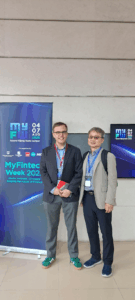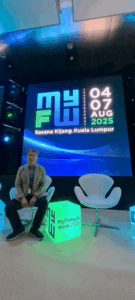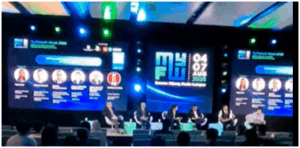First received 6 August 2025. Published online 7 August 2025.
(Below is a translated version of my essay in Korean, adapted for publication as an academic reflection piece using ChatGPT 4.0.)
Han Woo Park, Yeungnam University, South Korea ([email protected])
KEY WORDS: Web3 technologies, climate finance, inclusive innovation, Kuala Lumpur, Malaysia, My Fintech Week 2025, Asia School of Business, Pieter E. Stek.
ABSTRACT This reflective essay explores the intersection of Web3 technologies, climate finance, and inclusive innovation through the lens of a recent academic visit to Kuala Lumpur, Malaysia. Drawing on insights from the My Fintech Week 2025 conference and discussions with regional experts, the piece interrogates how decentralized digital systems—particularly blockchain, AI, and fintech—can address systemic financial inequalities while raising critical concerns about centralization, governance, and the role of small-scale stakeholders. The essay argues for a reimagined architecture of climate finance that prioritizes equity, transparency, and participatory design, offering relevance to both Southeast Asian and global contexts.
Introduction: A Return to Kuala Lumpur
My recent visit to Kuala Lumpur, Malaysia, after more than a decade away, offered not only a renewed appreciation of the city’s rapid transformation but also an invaluable opportunity to engage with its burgeoning role in global digital innovation. I was invited by Dr. Pieter E. Stek of the Asia School of Business (ASB), a business school jointly established with the MIT Sloan School of Management, known for its cross-disciplinary work in sustainability, strategy, and fintech. Dr. Stek, a Dutch academic and long-time colleague, leads research initiatives at ASB’s Center for Technology, Strategy & Sustainability. Kuala Lumpur, today, is not just a capital city—it is becoming a Web3 hub, home to globally respected platforms like Etherscan (2025) and CoinGecko (2025). Its visibility in the blockchain space has been rising, evidenced by recent visits from global figures such as Binance founder Changpeng Zhao, who met with Malaysia’s Prime Minister in April 2025. Such developments reflect the government’s growing support for a regulated yet progressive crypto and Web3 ecosystem.
Observations on Web3 in Practice
Even outside formal events, KL’s Web3 presence is tangible. While dining downtown, I overheard a young entrepreneur pitching a Solana-based NFT project to a Chinese-speaking client via video call. Their conversation—full of technical excitement and business negotiation—underscored how blockchain conversations are becoming part of everyday commercial culture in Kuala Lumpur. It became immediately clear that this city is not merely a passive recipient of global trends but an active shaper of them.
My Fintech Week 2025: Climate Finance Meets Technology
A key highlight of my visit was attending My Fintech Week 2025, organized by Bank Negara Malaysia (2025), the central bank. The conference brought together policy leaders, startups, scholars, and technologists to deliberate on financial innovation, digital transformation, and inclusive growth. ASB’s involvement in the financial cluster enabled its faculty to play a key role in these discussions, demonstrating the real-time engagement between research and policy-making.
I attended the panel “Tech-Powered Climate Finance,” moderated by Yiwen He of MOODY’S ESG Solutions, featuring six panelists including Dr. Stek and Adman Hassan of SME Bank. The panel examined how digital tools could address climate-related financial risks, including the mispricing of environmental externalities and the lack of standardized metrics for evaluating ecological impact.
A significant portion of the dialogue focused on the role of AI and blockchain in climate finance, particularly their potential to process and verify environmental data in decentralized systems. One panelist called for the development of generative AI platforms to assist in monitoring pollution and tracking sustainability behaviors across financial value chains. This aligns with emerging global thinking around climate tech and green fintech, which seeks to embed environmental intelligence directly into financial infrastructure.
Global Regulations and Local Impact: The Case of EUDR
Dr. Stek provided a sharp critique of the European Union Deforestation Regulation (EUDR)—a 2023 policy that requires goods entering the EU market to prove they are not linked to deforestation (European Commission, 2023). While well-intentioned, he argued, the regulation has disproportionately affected small-scale Malaysian palm oil producers, who often lack the technological and legal means to demonstrate compliance. This regulatory asymmetry, driven by lack of transparency in global supply chains, risks marginalizing vulnerable producers from global markets.
Dr. Stek proposed that fintech and blockchain tools could offer more equitable compliance frameworks—but only if developed through open and inclusive governance structures. He emphasized that current technological architectures, often controlled by large corporations or financial institutions, risk replicating the same power imbalances that decentralized systems were meant to solve. Reclaiming the Spirit of Decentralization
This insight speaks to a broader concern: the tension between decentralized ideals and centralized implementations in Web3. Dr. Stek warned that if user experience and protocol governance are monopolized by a few dominant actors, the promise of Web3—openness, inclusion, and autonomy—could be undermined.
These reflections resonate far beyond Malaysia. In Korea, similar patterns of centralization within digital infrastructure have emerged. The imperative to design systems that are equitable for small users—including farmers, gig workers, and micro-entrepreneurs—is as urgent in Seoul as it is in Kuala Lumpur. Without intervention, we risk reinforcing digital feudalism, where access, influence, and benefits are tightly concentrated.
Conclusion: A Call for Academic and Civic Engagement
My time in Kuala Lumpur reaffirmed the importance of embedding critical perspectives within digital innovation. Scholars and civil society must actively participate in shaping the values, governance models, and distributional outcomes of fintech and climate finance systems. If we abdicate this responsibility, the cost of technological exclusion may ultimately be paid in social and ecological degradation.
As Web3 evolves and global climate financing mechanisms expand, Southeast Asia offers a critical lens through which we can examine both the promises and pitfalls of digital transformation. It is our duty, as academics and public thinkers, to ensure that the next generation of financial technologies does not reproduce the very inequities it seeks to resolve.
References
• Bank Negara Malaysia (2025). MyFintech Week 2025 Highlights Transformative Forces in Finance, https://www.bnm.gov.my/-/myfw25-pr • CoinGecko (2025). About Us | CoinGecko. https://www.coingecko.com/ • Etherscan (2025). Ethereum Blockchain Explorer. https://etherscan.io/ • European Commission (2023). Regulation on Deforestation-free Products, https://environment.ec.europa.eu/topics/forests/deforestation/regulation-deforestation-free-products_en
Author Bio
Dr. Han Woo Park is a professor at Yeungnam University in South Korea and author of Web3 Technology and Democracy. His research explores the intersection of digital governance, decentralization, and public policy. He is currently focused on how emerging technologies such as blockchain, AI, and fintech can be leveraged for democratic innovation, climate justice, and inclusive finance in Asia and beyond.
 Photo taken in front of the event banner with Dr. Pieter Stek on left.
Photo taken in front of the event banner with Dr. Pieter Stek on left.
 Professor Han Woo Park’s Photo taken on stage as a memento of attending the event.
Professor Han Woo Park’s Photo taken on stage as a memento of attending the event.
 A full view of the “Tech-Powered Climate Finance” panel session.
Captured from https://youtube.com/shorts/6hMu7hQQHHY?feature=shared
A full view of the “Tech-Powered Climate Finance” panel session.
Captured from https://youtube.com/shorts/6hMu7hQQHHY?feature=shared